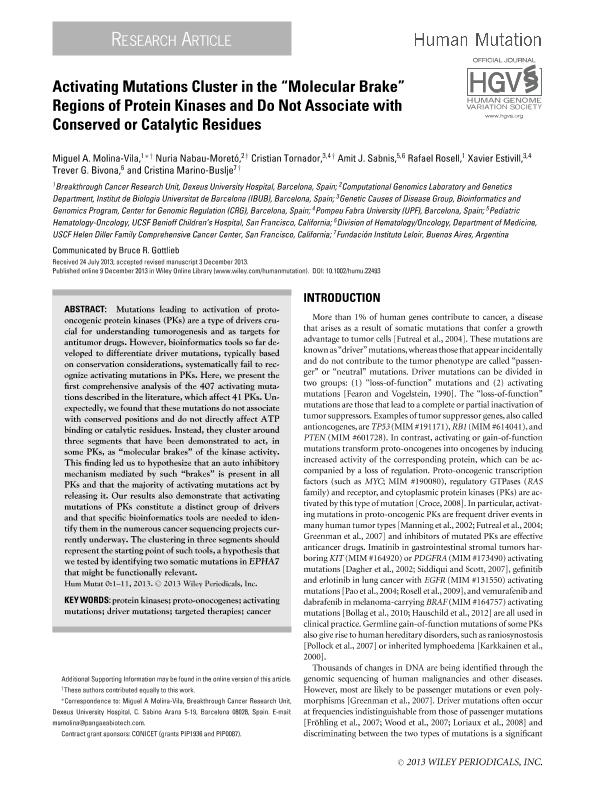Mostrar el registro sencillo del ítem
dc.contributor.author
Molina Vila, Miguel A
dc.contributor.author
Nabau Moretó, Nuria
dc.contributor.author
Tornador, Cristian
dc.contributor.author
Sabnis, Amit J
dc.contributor.author
Rosell, Rafael
dc.contributor.author
Estivill, Xavier
dc.contributor.author
Bivona, Trever G
dc.contributor.author
Marino, Cristina Ester

dc.date.available
2016-11-24T17:19:06Z
dc.date.issued
2014-03
dc.identifier.citation
Molina Vila, Miguel A; Nabau Moretó, Nuria; Tornador, Cristian; Sabnis, Amit J; Rosell, Rafael; et al.; Activating Mutations Cluster in the “Molecular Brake” Regions of Protein Kinases and Do Not Associate with Conserved or Catalytic Residues; Wiley; Human Mutation; 35; 3; 3-2014; 318-328
dc.identifier.issn
1059-7794
dc.identifier.uri
http://hdl.handle.net/11336/8352
dc.description.abstract
Mutations leading to activation of proto-oncogenic protein kinases (PKs) are a type of drivers crucial for understanding tumorogenesis and as targets for antitumor drugs. However, bioinformatics tools so far developed to differentiate driver mutations, typically based on conservation considerations, systematically fail to recognize activating mutations in PKs. Here, we present the first comprehensive analysis of the 407 activating mutations described in the literature, which affect 41 PKs. Unexpectedly, we found that these mutations do not associate with conserved positions and do not directly affect ATP binding or catalytic residues. Instead, they cluster around three segments that have been demonstrated to act, in some PKs, as "molecular brakes" of the kinase activity. This finding led us to hypothesize that an auto inhibitory mechanism mediated by such "brakes" is present in all PKs and that the majority of activating mutations act by releasing it. Our results also demonstrate that activating mutations of PKs constitute a distinct group of drivers and that specific bioinformatics tools are needed to identify them in the numerous cancer sequencing projects currently underway. The clustering in three segments should represent the starting point of such tools, a hypothesis that we tested by identifying two somatic mutations in EPHA7 that might be functionally relevant.
dc.format
application/pdf
dc.language.iso
eng
dc.publisher
Wiley

dc.rights
info:eu-repo/semantics/openAccess
dc.rights.uri
https://creativecommons.org/licenses/by-nc-sa/2.5/ar/
dc.subject
Cancer
dc.subject
Activating Mutation
dc.subject
Driver Mutations
dc.subject
Prediction Tools
dc.subject.classification
Otros Tópicos Biológicos

dc.subject.classification
Ciencias Biológicas

dc.subject.classification
CIENCIAS NATURALES Y EXACTAS

dc.title
Activating Mutations Cluster in the “Molecular Brake” Regions of Protein Kinases and Do Not Associate with Conserved or Catalytic Residues
dc.type
info:eu-repo/semantics/article
dc.type
info:ar-repo/semantics/artículo
dc.type
info:eu-repo/semantics/publishedVersion
dc.date.updated
2016-11-18T15:20:17Z
dc.journal.volume
35
dc.journal.number
3
dc.journal.pagination
318-328
dc.journal.pais
Estados Unidos

dc.description.fil
Fil: Molina Vila, Miguel A. Universitat Autònoma de Barcelona. Hospital Universitari Dexeus; España
dc.description.fil
Fil: Nabau Moretó, Nuria. Universitat de Barcelona. Institut de Biologia; España
dc.description.fil
Fil: Tornador, Cristian. Center for Genomic Regulation. Bioinformatics and
Genomics Program; España. Universitat Pompeu Fabra; España
dc.description.fil
Fil: Sabnis, Amit J. Benioff Children’s Hospital. Pediatric Hematology-Oncology; Estados Unidos. Helen Diller Family Comprehensive Cancer Center. Department of Medicine; Estados Unidos
dc.description.fil
Fil: Rosell, Rafael. Universitat Autònoma de Barcelona. Hospital Universitari Dexeus; España
dc.description.fil
Fil: Estivill, Xavier. Universitat Pompeu Fabra; España. Center for Genomic Regulation. Bioinformatics and Genomics Program; España
dc.description.fil
Fil: Bivona, Trever G. Helen Diller Family Comprehensive Cancer Center. Department of Medicine; Estados Unidos
dc.description.fil
Fil: Marino, Cristina Ester. Consejo Nacional de Investigaciones Científicas y Técnicas. Oficina de Coordinación Administrativa Parque Centenario. Instituto de Investigaciones Bioquimicas de Buenos Aires; Argentina. Fundación Instituto Leloir; Argentina
dc.journal.title
Human Mutation

dc.relation.alternativeid
info:eu-repo/semantics/altIdentifier/url/http://onlinelibrary.wiley.com/wol1/doi/10.1002/humu.22493/abstract
dc.relation.alternativeid
info:eu-repo/semantics/altIdentifier/doi/http://dx.doi.org/10.1002/humu.22493
Archivos asociados
